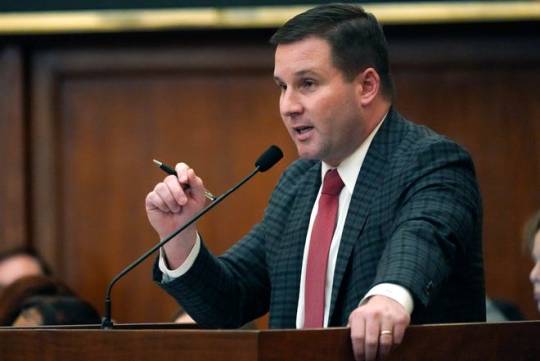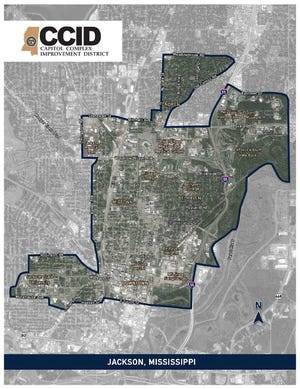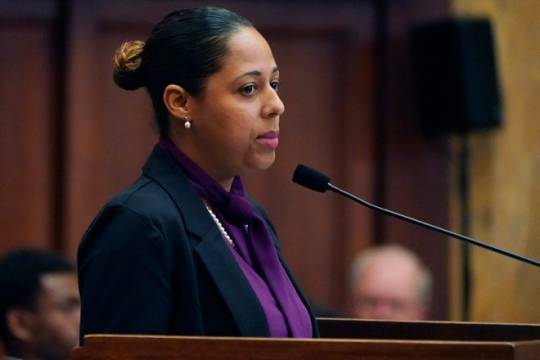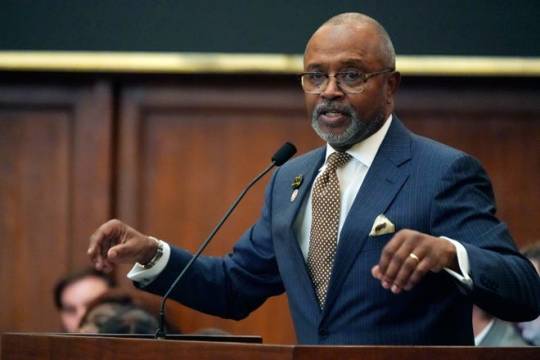#Jackson city leaders pass resolution opposing House Bill 1020
Explore tagged Tumblr posts
Text
JACKSON SAYS BACK BACK WE GOT THIS: Jackson city leaders pass resolution opposing House Bill 1020, calling the bill racist and disrespectful
JACKSON, Miss. (WLBT) - House Bill 1020 continues to receive a lot of backlash. This time from the Jackson City Council.
During a special called meeting on Friday, the council passed a resolution saying they oppose the bill.
The council also voted to give a copy of the resolution to every lawmaker in the House and Senate.
Under this bill, the Mississippi Supreme Court would appoint judges to hear civil and criminal cases in the Capital Complex Improvement District.
The legislation would also expand CCID to County Line Road.
The bill states the Attorney General’s Office would be responsible for appointing prosecutors to take on these cases, and public defenders would work underneath the Mississippi Public Defenders.
City leaders question the timing of this proposed takeover, calling the bill disrespectful and racist.
“I am in favor of trying to keep Jackson safe, but not this way,” said Councilwoman Angelique Lee, who represents Ward 2. “I’m also opposed to how the boundaries are drawn. It appears racist on its face, and it is not equally representative of the citizenry Jackson, Mississippi, which is majority black.”
“People of Hinds County, city of Jackson have their rights, and their rights can’t be taken away, won’t be taken away without a fight,” said Councilman Vernon Hartley, who represents Ward 2.
“At the end of the day, we have to deal with the culture that is at that State Capitol, which is, the city of Jackson has their own Representatives, their own elected officials, let them deal figure this stuff out, and if they can’t do it we’ll come in and take over,” said Councilman Aaron Banks, who represents to Ward 5. “At the end of the day, all of this is about them wanting to take over and put their own district within the Capital City of Jackson, and this is our home. Instead of embracing us, they just want to takeover, and we oppose that.”
City leaders held a press conference immediately following the council meeting, showing a unified front that they all disagree with this bill.
“A lot of these bills that affect our city are being introduced without any input from the people who actually live here and the elected representatives that serve with the other members of the legislature,” said Senator Davis Blount, who represents District 29, which includes Hinds County. Lawmakers have until February ninth to vote on this bill. If it doesn’t come up for a vote by that time, the bill will die.
#Jackson city leaders pass resolution opposing House Bill 1020#calling the bill racist and disrespectful#Jackson Mississippi#separate and unequal in 2023#Hinds county#Black Votes Matter#Ward 5
3 notes
·
View notes
Text
"The passage of House Bill 1020 came in spite some of the starkest possible opposition from Jackson's mayor, its city council and its representatives in the House, many of whom said the bill reminded them of the darkest days of Mississippi's racist past.
After nearly five hours of debate on the House floor the chamber passed the bill that would create an unelected state-appointed court system within the city of Jackson, as conflict between the city and state continues to be one of the key themes of the 2023 legislative session.
The bill passed, 76-38, with only one member of the Jackson delegation supporting it.
More:What legislators saidSee some of the most explosive quotes from the House debate on unelected Jackson courts.
If passed by the Senate and approved by the governor, the bill would create a new court system for cases occurring within the Capitol Complex Improvement District (CCID), an area that could expand.
The bill has faced significant criticism since it was first introduced last month.
Jackson Mayor Chokwe Antar Lumumba, who looked on from the House gallery during the debate, said last week that it "reminds me of apartheid."
Also last week, a number of judges from the Hinds County court system spoke out against it, including Senior Hinds County Circuit Court Judge Winston Kidd.
Ways and Means Committee Chairman Trey Lamar, R-Senatobia, answers questions regarding proposed House Bill 1020 that would create a separate district composed of appointed prosecutors and judges for the Capitol Complex Improvement District for a portion of Jackson on Tuesday at the Mississippi Capitol, in Jackson.
The Jackson City Council called a meeting Saturday to vote on a resolution opposing the bill. Every councilmember present, including the sole Republican, Ashby Foote, voted for the resolution.
As Rep. Trey Lamar, R-Senatobia, came forward to propose the bill Tuesday, he seemed to address the news headlines that his bill had made, saying Jackson has a crime problem and a judicial backlog that must be managed.
"I don't know what you've heard, I'll say that, but this bill is designed to help make our capital city of Mississippi a safer city. This bill is designed to assist the court system of Hinds County, not to hinder it. It is designed to add to our judicial resources in Hinds County, not to take away. To help, not to hurt," Lamar said.
Critics, including those elected by the people of Jackson, disagree. They say the bill is not wanted by Jackson residents or leaders within the court and that it dilutes the voting power of Jackson residents, violates the state constitution and does little to address root causes of crime.
"I have not heard that anyone from the City of Jackson, Mississippi who is an elected official is in favor of this," said Rep. Edward Blackmon, D-Canton. "This is a land grab, has nothing to do with crime."
The new court system would have judges and a clerk, appointed by the chief justice of the state supreme court, and prosecutors appointed by the attorney general. Currently, the chief justice is from Hattiesburg, more than an hour and a half from the capital, while the current attorney general is from Holly Springs, more than three hours away.
A map of the boundaries of the Capitol Complex Improvement District, as created by the legislature in 2017.
Lamar amended the bill, cutting it from more than 1000 pages down to less than 40 in the process, to remove provisions that would have given the new court sole jurisdiction over lawsuits involving the state.
Blackmon, speaking against that amendment, said the new court would oversee both civil and criminal cases, and that should be a sign to observers that the true underlying issue is not about crime.
"This bill is about helping to fight crime?" Blackmon said. "What does civil litigation have to do with crime in the state of Mississippi?"
If the state was serious about fighting crime in Jackson, Blackmon said, it would increase funding for the state crime lab, which has been cited by law enforcement leaders as a key cause of backlogs.
"I notice that this bill does not address part of the problem, which is lack of funding at that crime lab. You're blaming Jackson because they can't process their cases fast enough because the crime lab is not operating at capacity because we won't give them the money," Blackmon said.
Democrats proposed eight amendments to Lamar's amendment, including ones to make CCID judges elected and to require they be residents of Hinds County. The one amendment that did succeed, proposed by Rep. Cheikh Taylor, D-Starkville, would require Capitol Police officers to wear body cameras. The department's officers were involved in more than a dozen shootings last year.
"This amendment is all about protection, furthering the protection of civilians and also police officers. For those that are in favor of this bill, it does the bill no violence. For those opposed to this bill, it gives further protections to citizens who may be under duress from officers who may not be held accountable because there is no video footage," Taylor said.
After discussions between Taylor and Lamar, language mandating the firing of officers that do not wear the cameras was removed, and the amendment succeeded via vioce vote.
Lamar's response to the amendment to make the judges Hinds County residents, which was proposed by Rep. Robert Johnson, D-Natchez, drew the ire of many of the chamber's Black members.
"If we're going to make an additional court in the city of Jackson, do we not want our best and brightest sitting in judgment, whether that may come from Holmes County or Madison County or wherever they may be? Why would we limit the talent pool to here?" Lamar said.
Blackmon asked Johnson a question about what Lamar could have meant.
"What does it imply when you say have a city of 83, that's 83% African American, when you have a statement made from that podium that the desire, the reason you want to go outside of Jackson, is because you want to have the 'best and brightest' in the state?" Blackmon asked.
"What is says to me is, maybe because you've got a Black County with Black judges, maybe they might not be the best and the brightest. Well, I will tell you, I disagree," Johnson said. "They've got the same training, the same education, (and they) probably had to work a little harder to get it."
Hours later, when the statement was brought back up, Lamar said he had been "misconstrued."
"That's not what I'm saying at all. The best person for the job may very well come from Hinds County, and if so the supreme court can appoint that person," Lamar said.
Lamar lives more than two hours away. He repeated a belief from the House floor Tuesday that, as the capital city, Jackson doesn't just belong to the citizens of Jackson.
"The city of Jackson is the capital city of the state of Mississippi, whether you are from Southaven or Gulfport. It is our capital city. It does not belong solely to the citizens of Jackson, OK?" Lamar said.
Lamar said there are already unelected judges serving over cases in Hinds County, but those judges are funded by expiring federal funds from the American Rescue Plan Act, and this is an attempt to more permanently address the problem.
"Why wouldn't you just provide more money to the existing court system to reduce the backlog?" Rep. Zakiya Summers, D-Jackson, asked Lamar.
"Lady, this is the bill that's before the body," Lamar responded.
Summers later pointed out that the current appointed judges are overseen by elected Hinds County judges, and not state officials. She said Lamar's bill would create a "separate but unequal court."
A later question, from Rep. Tracey Rosebud, D-Tutwiler, asked why the legislature should take away authority from Hinds County judges. Lamar said he does not see it that way because the two courts would have concurrent jurisdictions, meaning the Hinds County District Attorney could file cases within the CCID, and CCID prosecutors could file cases within the county courts.
"If the prosecutor wants to indict someone in Hinds County Circuit they still have the ability to do that," Lamar said.
Rep. Christopher Bell, D-Jackson, asked Lamar to name people from Hinds County he had spoken with about the legislation. Lamar said there are several residents he has spoken to.
"Do they look like me?" Bell asked. "You don't have to answer that."
"All God's children are unique. We're all God's children," Lamar responded.
Once Lamar had finished taking questions, it was time for members of the body to speak on the bill. One by one, 12 Black Democrats rose to urge their colleagues to vote no. Other than Lamar, no one spoke in support of the bill.
Blackmon, who recalled being jailed as a younger man for seeking the right to vote, told lawmakers that this moment called back to the state's infamous past.
"Only in Mississippi would we have a bill like this, with our history, where you say solving the problem is taking the vote away from Black people because we don't know how to choose our leaders. That's the problem. And the Trojan Horse that has been brought forward in this bill is called crime," Blackmon said. "I'm old enough to know and understand that the right to vote has not always been ours, and perhaps I'm a little more sensitive to the idea that that vote can be taken away."
Blackmon was one of many lawmakers to claim the bill is unconstitutional.
"This bill is going to pass, make no mistake about it. We'll be back in federal courts again doing what we were doing in the 60s and the 70s, to regain our rights again," Blackmon said.
Rep. Solomon Osborne, D-Greenwood, also thought back to the days of Jim Crow.
Black caucus:How the Mississippi Legislative Black Caucus has changed, served members over the years
Will Jackson lose control of its water?Here's what you should know about state efforts to regionalize the Jackson water system
Mayoral veto bill:Bill saying mayors cannot veto no votes gets initial approval, amid Jackson trash fight
"I've been here for 74 years and one thing I can do is recognize a racist when I see one ... racist actions when I see them, and this is a racist bill," Osborne said, to cheers from those in the gallery, which were quickly gaveled down by House Speaker Pro Tempore Jason White, R-West.
"People come up with all kinds of measures to take away our rights and to oppress the Black Folks in Mississippi. I don't even know why I'm down here, frankly, because it's like being at a Klan rally with people with suits on. That's the only difference I see between these people here. They wear suits rather than sheets," Osborne said. "Every day we get up here and open this body with prayer. I wonder what God are these people praying to?"
Johnson said when people like Blackmon and Osborne, with experience in Mississippi's past, speak on these issues they should be taken seriously.
"We don’t talk about race because it’s convenient. We talk about race because it’s factual," Johnson said.
Rep. John Hines, D-Greenville, said the legislature needs to do more to support people in need if it wants to see crime decrease.
"If you really want Jackson safe, put the resources in place where we can put mental health services in place, where we can have quality housing for people, where we can insure and where can make so kids got somewhere to go and play and something to do. We ain't doing it. We have not done it at all," Hines said.
Hines went on to say that this action will only reinforce Mississippi's poor reputation on race.
"Again, we end up being the laughingstock of America because of what we do here today," Hines said.
Johnson said actions taken against Jackson stand in stark contrast to what state legislature has done regarding white collar crimes, particularly the massive welfare fraud scandal uncovered in recent years.
"The people who did the wrong were white. Stole $95 million from poor children, and this body hasn't said one time, 'Let's take over that agency and make it work right. Let's take those people out of office, take the power that they have to run that agency and take it and put it in the hands of the legislature so it can be done right.' And the only difference we see is they're white, and the mayor and the city council and the supervisors in Hinds County are Black," Johnson said.
Rep. Earle Banks, D-Jackson, addressed Lamar's comments about to whom the capital city belongs.
"This is your capital city, as many of you say, but this is my home," Banks said.
Knowing that they were unlikely to change the minds of their white Republican colleagues, some Black representatives chose to look forward.
"I'm going to speak to the citizens and the voters of the city of Jackson. We may lose the battle today, but I want you to know that the people of your Hinds County delegation have been fighting very hard against this bill. The victory belongs to God. We have elections coming up this year. Keep in mind what happens today," Summers said.
As Lamar again rose to the podium following the onslaught of criticism, he promised to keep it brief, noting that every Democrat in the chamber voted to create the CCID in 2017. He flatly denied any racial motivation behind the bill.
"So, I get the fun job of having to close after all that. Where in the world do I start?" Lamar said. "I'm not going to holler and scream and put on a show."
The only member from Jackson to vote for the bill was independent Shanda Yates, whose district includes a small part of Northeast Jackson along with areas in Madison County.
Though it would have cleared either bar, a procedural decision ruled that it could pass by a simple-majority, despite the Legislature's website initially stating it would require a three fifths vote.
It now heads to the Senate. During a January news conference, Republican Lt. Gov. Delbert Hosemann said he could see the bill reaching the Senate floor, though at the time he had not yet read it or spoken with Lamar.
Democrats in that chamber have also vowed to oppose the bill."
Complete bastards. Crime has been bad because the state of Mississippi has underfunded and understaffed the departments that handle crime materials.
0 notes
Text
KU KLUX COURT IN 2023 MISSISSIPPI: MS bill 1020 creates separate unelected court system in Jackson district

The passage of House Bill 1020 came in spite some of the starkest possible opposition from Jackson's mayor, its city council and its representatives in the House, many of whom said the bill reminded them of the darkest days of Mississippi's racist past.
After nearly five hours of debate on the House floor the chamber passed the bill that would create an unelected state-appointed court system within the city of Jackson, as conflict between the city and state continues to be one of the key themes of the 2023 legislative session.
The bill passed, 76-38, with only one member of the Jackson delegation supporting it.
More:What legislators said See some of the most explosive quotes from the House debate on unelected Jackson courts
If passed by the Senate and approved by the governor, the bill would create a new court system for cases occurring within the Capitol Complex Improvement District (CCID), an area that could expand.
The bill has faced significant criticism since it was first introduced last month.
Jackson Mayor Chokwe Antar Lumumba, who looked on from the House gallery during the debate, said last week that it "reminds me of apartheid."

The Jackson City Council called a meeting Saturday to vote on a resolution opposing the bill. Every councilmember present, including the sole Republican, Ashby Foote, voted for the resolution.
As Rep. Trey Lamar, R-Senatobia, came forward to propose the bill Tuesday, he seemed to address the news headlines that his bill had made, saying Jackson has a crime problem and a judicial backlog that must be managed.
"I don't know what you've heard, I'll say that, but this bill is designed to help make our capital city of Mississippi a safer city. This bill is designed to assist the court system of Hinds County, not to hinder it. It is designed to add to our judicial resources in Hinds County, not to take away. To help, not to hurt," Lamar said.
Critics, including those elected by the people of Jackson, disagree. They say the bill is not wanted by Jackson residents or leaders within the court and that it dilutes the voting power of Jackson residents, violates the state constitution and does little to address root causes of crime.
"I have not heard that anyone from the City of Jackson, Mississippi who is an elected official is in favor of this," said Rep. Edward Blackmon, D-Canton. "This is a land grab, has nothing to do with crime."

Lamar amended the bill, cutting it from more than 1000 pages down to less than 40 in the process, to remove provisions that would have given the new court sole jurisdiction over lawsuits involving the state.
Blackmon, speaking against that amendment, said the new court would oversee both civil and criminal cases, and that should be a sign to observers that the true underlying issue is not about crime.
"This bill is about helping to fight crime?" Blackmon said. "What does civil litigation have to do with crime in the state of Mississippi?"
If the state was serious about fighting crime in Jackson, Blackmon said, it would increase funding for the state crime lab, which has been cited by law enforcement leaders as a key cause of backlogs.
"I notice that this bill does not address part of the problem, which is lack of funding at that crime lab. You're blaming Jackson because they can't process their cases fast enough because the crime lab is not operating at capacity because we won't give them the money," Blackmon said.
Democrats proposed eight amendments to Lamar's amendment, including ones to make CCID judges elected and to require they be residents of Hinds County. The one amendment that did succeed, proposed by Rep. Cheikh Taylor, D-Starkville, would require Capitol Police officers to wear body cameras. The department's officers were involved in more than a dozen shootings last year.
"This amendment is all about protection, furthering the protection of civilians and also police officers. For those that are in favor of this bill, it does the bill no violence. For those opposed to this bill, it gives further protections to citizens who may be under duress from officers who may not be held accountable because there is no video footage," Taylor said.
After discussions between Taylor and Lamar, language mandating the firing of officers that do not wear the cameras was removed, and the amendment succeeded via vioce vote.
Lamar's response to the amendment to make the judges Hinds County residents, which was proposed by Rep. Robert Johnson, D-Natchez, drew the ire of many of the chamber's Black members.
"If we're going to make an additional court in the city of Jackson, do we not want our best and brightest sitting in judgment, whether that may come from Holmes County or Madison County or wherever they may be? Why would we limit the talent pool to here?" Lamar said.

"What does it imply when you say have a city of 83, that's 83% African American, when you have a statement made from that podium that the desire, the reason you want to go outside of Jackson, is because you want to have the 'best and brightest' in the state?" Blackmon asked.
"What is says to me is, maybe because you've got a Black County with Black judges, maybe they might not be the best and the brightest. Well, I will tell you, I disagree," Johnson said. "They've got the same training, the same education, (and they) probably had to work a little harder to get it."
Hours later, when the statement was brought back up, Lamar said he had been "misconstrued."
"That's not what I'm saying at all. The best person for the job may very well come from Hinds County, and if so the supreme court can appoint that person," Lamar said.
Lamar lives more than two hours away. He repeated a belief from the House floor Tuesday that, as the capital city, Jackson doesn't just belong to the citizens of Jackson.
"The city of Jackson is the capital city of the state of Mississippi, whether you are from Southaven or Gulfport. It is our capital city. It does not belong solely to the citizens of Jackson, OK?" Lamar said.
Lamar said there are already unelected judges serving over cases in Hinds County, but those judges are funded by expiring federal funds from the American Rescue Plan Act, and this is an attempt to more permanently address the problem.
"Why wouldn't you just provide more money to the existing court system to reduce the backlog?" Rep. Zakiya Summers, D-Jackson, asked Lamar.
"Lady, this is the bill that's before the body," Lamar responded.

Summers later pointed out that the current appointed judges are overseen by elected Hinds County judges, and not state officials. She said Lamar's bill would create a "separate but unequal court."
A later question, from Rep. Tracey Rosebud, D-Tutwiler, asked why the legislature should take away authority from Hinds County judges. Lamar said he does not see it that way because the two courts would have concurrent jurisdictions, meaning the Hinds County District Attorney could file cases within the CCID, and CCID prosecutors could file cases within the county courts.
"If the prosecutor wants to indict someone in Hinds County Circuit they still have the ability to do that," Lamar said.
Rep. Christopher Bell, D-Jackson, asked Lamar to name people from Hinds County he had spoken with about the legislation. Lamar said there are several residents he has spoken to.
"Do they look like me?" Bell asked. "You don't have to answer that."
"All God's children are unique. We're all God's children," Lamar responded.
Once Lamar had finished taking questions, it was time for members of the body to speak on the bill. One by one, 12 Black Democrats rose to urge their colleagues to vote no. Other than Lamar, no one spoke in support of the bill.
Blackmon, who recalled being jailed as a younger man for seeking the right to vote, told lawmakers that this moment called back to the state's infamous past.
"Only in Mississippi would we have a bill like this, with our history, where you say solving the problem is taking the vote away from Black people because we don't know how to choose our leaders. That's the problem. And the Trojan Horse that has been brought forward in this bill is called crime," Blackmon said. "I'm old enough to know and understand that the right to vote has not always been ours, and perhaps I'm a little more sensitive to the idea that that vote can be taken away."
Blackmon was one of many lawmakers to claim the bill is unconstitutional.
"This bill is going to pass, make no mistake about it. We'll be back in federal courts again doing what we were doing in the 60s and the 70s, to regain our rights again," Blackmon said.
Rep. Solomon Osborne, D-Greenwood, also thought back to the days of Jim Crow.
Black caucus:How the Mississippi Legislative Black Caucus has changed, served members over the years
Will Jackson lose control of its water?Here's what you should know about state efforts to regionalize the Jackson water system
Mayoral veto bill:Bill saying mayors cannot veto no votes gets initial approval, amid Jackson trash fight
"I've been here for 74 years and one thing I can do is recognize a racist when I see one ... racist actions when I see them, and this is a racist bill," Osborne said, to cheers from those in the gallery, which were quickly gaveled down by House Speaker Pro Tempore Jason White, R-West.
"People come up with all kinds of measures to take away our rights and to oppress the Black Folks in Mississippi. I don't even know why I'm down here, frankly, because it's like being at a Klan rally with people with suits on. That's the only difference I see between these people here. They wear suits rather than sheets," Osborne said. "Every day we get up here and open this body with prayer. I wonder what God are these people praying to?"

"We don’t talk about race because it’s convenient. We talk about race because it’s factual," Johnson said.
Rep. John Hines, D-Greenville, said the legislature needs to do more to support people in need if it wants to see crime decrease.
"If you really want Jackson safe, put the resources in place where we can put mental health services in place, where we can have quality housing for people, where we can insure and where can make so kids got somewhere to go and play and something to do. We ain't doing it. We have not done it at all," Hines said.
Hines went on to say that this action will only reinforce Mississippi's poor reputation on race.
"Again, we end up being the laughingstock of America because of what we do here today," Hines said.
Johnson said actions taken against Jackson stand in stark contrast to what state legislature has done regarding white collar crimes, particularly the massive welfare fraud scandal uncovered in recent years.
"The people who did the wrong were white. Stole $95 million from poor children, and this body hasn't said one time, 'Let's take over that agency and make it work right. Let's take those people out of office, take the power that they have to run that agency and take it and put it in the hands of the legislature so it can be done right.' And the only difference we see is they're white, and the mayor and the city council and the supervisors in Hinds County are Black," Johnson said.
Rep. Earle Banks, D-Jackson, addressed Lamar's comments about to whom the capital city belongs.
"This is your capital city, as many of you say, but this is my home," Banks said.

"I'm going to speak to the citizens and the voters of the city of Jackson. We may lose the battle today, but I want you to know that the people of your Hinds County delegation have been fighting very hard against this bill. The victory belongs to God. We have elections coming up this year. Keep in mind what happens today," Summers said.
As Lamar again rose to the podium following the onslaught of criticism, he promised to keep it brief, noting that every Democrat in the chamber voted to create the CCID in 2017. He flatly denied any racial motivation behind the bill.
"So, I get the fun job of having to close after all that. Where in the world do I start?" Lamar said. "I'm not going to holler and scream and put on a show."
The only member from Jackson to vote for the bill was independent Shanda Yates, whose district includes a small part of Northeast Jackson along with areas in Madison County.
Though it would have cleared either bar, a procedural decision ruled that it could pass by a simple-majority, despite the Legislature's website initially stating it would require a three fifths vote.
It now heads to the Senate. During a January news conference, Republican Lt. Gov. Delbert Hosemann said he could see the bill reaching the Senate floor, though at the time he had not yet read it or spoken with Lamar.
Democrats in that chamber have also vowed to oppose the bill.
#Jackson Mississippi#Voter Disinfranchisement#seperate and unequal#Hinds County#MS bill 1020 creates separate unelected court system in Jackson district
5 notes
·
View notes
Text
US APARTHEID 2023- HELLO MISSISSIPPI WE WATCHING YOU: Mississippi GOP passes ‘apartheid’ bill to create unelected courts system in majority-Black capital of Jackson
Mississippi’s Republican-controlled House voted on Tuesday to create a separate court system composed of unelected leaders and an expanded police force in the capital of Jackson.
The proposal, HB 1020, has been put forth by its GOP backers as a measure to increase public safety and reduce backlogs in the courts, but local leaders have argued the measure is a power grab from the state’s largely conservative, white legislature against the majority Black population of Jackson.
“Only in Mississippi would we have a bill like this … where we say solving the problem requires removing the vote from Black people,” Rep Ed Blackmon, a Democrat, said at the legislature on Tuesday.
He added that the measure, which would allow state officials to appoint judges and prosecutors instead of the usual local process of electing them, wouldn’t do anything to reduce crime.
"I notice that this bill does not address part of the problem, which is lack of funding at that crime lab. You’re blaming Jackson because they can’t process their cases fast enough because the crime lab is not operating at capacity because we won’t give them the money," he added.
Last week, Chokwe Antar Lumumba, the mayor of Jackson, said HB 1020 "reminds me of apartheid."
The Jackson City Council, including the sole Republican present, Ashby Foote, voted on Saturday for a resolution opposing the bill, according to the Mississippi Clarion Ledger.
Rep Trey Lamar, a Republican from Senatobia, 175 miles outside of Jackson, defended the bill on Tuesday, saying it would make the capital safer.
"I don’t know what you’ve heard, I’ll say that, but this bill is designed to help make our capital city of Mississippi a safer city,” he said. “This bill is designed to assist the court system of Hinds County, not to hinder it. It is designed to add to our judicial resources in Hinds County, not to take away. To help, not to hurt.”
The capital has indeed struggled with public safety.
According to a 2022 report from the state auditor, Mississippi has had the highest homicide rate of any state in the country since 2018, with more homicides per capita in Jackson than any other major metropolitan area in the country in 2021.
The state, like numerous other cities, has also struggled with what community residents argue is excessive police force.
Last month, family members of Jaylen Lewis, who was killed by police last fall during a traffic stop, called for a federal investigation into the Capitol Police, who would get millions in new funding under HB 1020.
Few details have been released about the shooting, but the officers involved are on administrative leave and the Mississippi Bureau of Investigation is probing the case
As WLBT reports, the Capitol Police have fired on civilians four times in the last five months, more than any other Mississippi law enforcement agency in the last year.
#mississippi#mississippi 2023#systemic racism#voter disinfranchisement#unelected courts#Mississippi GOP passes ‘apartheid’ bill to create unelected courts system in majority-Black capital of Jackson#Jackson Mississippi
2 notes
·
View notes